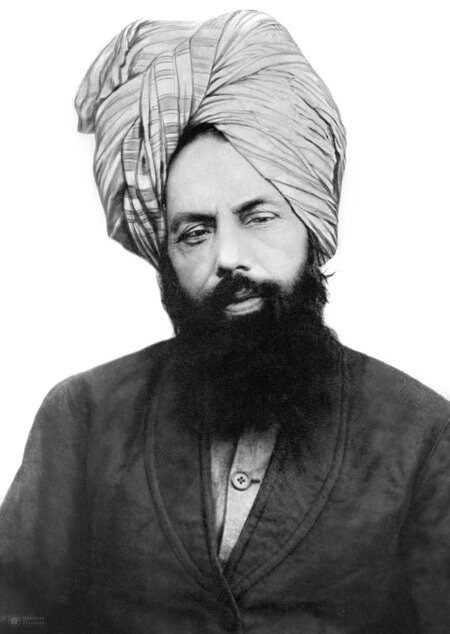Sabahat Ali Rajput, Missionary in Mexico

While the extenuating circumstances brought upon us by Covid-19 have temporarily forced the doors of mosques, high and low, to be closed, there is another masjid whose doors still stand invitingly open, with welcoming arms for each one of us.
The question is, can we find it in time?
The Arabic word masjid, which is traditionally taken to mean the physical structure where Muslims offer their five daily prayers, contains a universe of profundity within itself. It does not merely convey the archetypal meaning of a physical structure, but also connotes the timeof prayer. In fact, the word masjid follows the form ism zarf, which conveys the meaning of both the place as well as the time of its root word.
The illustrious and pioneer translators of the Holy Quran in the Ahmadiyya Muslim Community – Hazrat Maulvi Sher Alira and Hazrat Sir Chaudhry Zafarulla Khanra – have both incorporated the dimension of time into their respective translations of the word masjid.
Hazrat Maulvi Sher Alira, for instance, for the following verse:
قُلۡ اَمَرَ رَبِّیۡ بِالۡقِسۡطِ ۟ وَ اَقِیۡمُوۡا وُجُوۡہَکُمۡ عِنۡدَ کُلِّ مَسۡجِدٍ
translates it as:
“And say, my Lord has enjoined justice. And fix your attention aright at every time and placeof worship…” (Translation of Surah al-A‘raf, Ch.7: V.30)
Similarly, the august Hazrat Sir Chaudhry Zafarulla Khanra translates the word masjid in a similar light. He writes:
“Tell them: My Lord has enjoined justice and that you fix your attention aright at every time and place of worship…” (Translation of Surah al-A‘raf, Ch.7: V.30)
The mosques made of time
It is marvelous how the language of the Holy Quran throws open galaxies of understanding which abound in the stars of spiritual and intellectual secrets.
While we may not be able to fill the physical structure called masjid in these days, we can certainly fill another mosque made from the intangible and imperceptible fabric of time. The truth is that by its very definition, each time of prayer is literally a masjid – one which waits in anxious anticipation for us to set aside our self-isolation and quarantine-activities and fill it with our “minds and bodies”.
And so, even if the doors of the masjid made from bricks and mortar are closed for some time, the masjid woven from the metaphysical fabric of time unravels its red carpet for us five times a day – Fajr, Zuhr, Asr, Maghrib and Isha – each one, a literal masjid; each one, a time for prayer.
More fascinating still is the fact that God Almighty begins the above verse by inviting mankind towards justice. After all, what connection is there between an invitation to justice and offering prayers on time?
The word for justice in Arabic is ‘adl and the Promised Messiahas has defined this as “the putting or placement of a thing in its proper place at its proper time.” Hence, the very words with which Allah the Almighty opens the verse are a key to unearthing the troves of spectacular treasures contained therein.
The Promised Messiahas has explained that the concept of justice extends to God Almighty as well as His creation. So what does it mean – to do God justice? The Holy Prophet Muhammadsa explains that while offering our prayers, it is “to look at God as though you are seeing Him, and if not (this), then to pray as though He is looking at you.” (Sahih al-Bukhari, Kitab-ul-Iman).

And so, even within the masjid erected by the walls of time, there are towering, lofty standards expected of us. In addition to being particularly focused in mind and body and establishing a pristine “tidiness” at our place of worship, a believer stands before his Lord as though he is looking at Him.
These days, we are largely confined to our homes for prayers, thus the commandment of “putting [our] minds and bodies in a state of tidiness” takes on an incredible new meaning.
Once, the Promised Messiahas commented on the need for prioritising our time exclusively for prayer. The following quote forces us to seriously reconsider how we spend our time at home nowadays. He said:
“At most, Salat might occupy an hour, although some prayers do not even require 15 minutes to offer. Then, it is a matter of great astonishment that the time for prayer is considered a waste of time, while it possesses such an abundance of good and benefit. And if the entire day as well as night are wasted in vain and useless pursuits, or in frivolities and horseplay, it is referred to as “being busy”. If such people were possessed of firm faith, let alone firm; if they had any faith at all, then why would their conditions be so deplorable and why would it get to this point?” (Risalat-ul-Inzar [as reproduced in Malfuzat, Vol. 1, p. 164 – Urdu edition])
A secret hidden in a sparrow’s nest
One would be hard-pressed to find a Muslim who is not familiar with the all-too-famous narration of the Holy Prophet Muhammadsa in which he stated, “Whoever builds a house for the sake of Allah, Allah will build a similar home for him in paradise.” (Sunan Ibn Majah, Kitab-ul-Masajid wa al-Jama‘ah)
However, there is a particularly intriguing version of this narration in which he also said:
“Whoever builds a masjid (mosque) for the sake of Allah, like a sparrow’s nest or even smaller, Allah will build for him a house in Paradise.” (Sunan Ibn Majah, Kitab-ul-Masajid wa al-Jama‘ah)
The glaring question is, “What masjid is like a sparrow’s nest or even smaller?” Obviously, this is a metaphor.
Firstly, it is an established fact that the word masjid also refers to the times of prayer. Secondly, the word used in the narration is derived from the root ‘ammara, which refers to “filling a place or span of time.” (Lane)
Hence, the only masjid which can be compared to a sparrow’s nest in its size, or even smaller than that, is the masjid of time – the times of prayer – for each time of prayer is limited and demands that it be filled according to its properly appointed hour. And in the given circumstances, this could also point to a corner of our homes that we allocate for congregational prayers.
The philosophy of prostration and a heavenly vehicle
In 2011, while addressing a decorated audience at the opening of Bait-un-Nasr Mosque in Oslo, Norway, Hazrat Khalifatul Masih Vaa explained:
“The Arabic word for the mosque is masjid, and masjid is derived from the Arabic word sajada, which literally means ‘he prostrated himself’. So, if we analyse the literal meaning of ‘mosque’, it leads us only towards a path of prayer and prostration.
“One question that naturally arises is how should such prostration be performed? The answer is that when a Muslim bows down in prayer, his whole body should be encompassed by absolute humility, and he should consider himself to be worthless. In this spirit of humility, he should prostrate before God with total submission and obedience. In this subservient state, he should pray to God that may He enable him to follow God’s every command, perfectly. Thus, this is what a true mosque is; a place of total humility to bow before God Almighty.”
The Promised Messiahas described the daily prayer with a beautiful metaphor which, quite literally, transports one to cloud nine. He stated:
“Truthfully speaking, the rule is that if man wishes to arrive at a particular destination, then he has to walk for this. Whatever the distance to his destination, he must need walk with the same brevity, effort, determination and time. So, to reach God is also a destination and its distance and length is extensive. Hence, for one who seeks to meet God and possesses a yearning to reach His Divine court, the daily prayer is a vehicle by riding which he can arrive there more quickly. And as for the one who abandons prayer, how will he ever make it there at all?” (Malfuzat, Vol. 3, p. 189)
And so, while in this time, the dictates of mercy demand that the doors of the physical masjidbe temporarily closed to protect mankind from the risks of Covid-19, may Allah the All-Knowing enable each one of us to open up the doors of the masjid which exists within each one of our homes, each one of our timetables and indeed, in each one of our hearts – mosques made from the impassioned flames of Divine love, fueled by the oil of anticipation to see the glorious day that our beloved mosques are opened for us once again.
And this time, may the mosques on the ground and mosques in our hearts race unceasingly toward each other like long-lost lovers together again at last.


JazakAllah for this informative article. I realise now that I didn’t not understand the real meaning of the word masjid. To be honest I was quite sad that we couldn’t go to masjid anymore especially because of the kids. They are still very young but we have already inculcated in them this habit of going to masjid for namaz and Jummah. So right now we do namaz bajamaat 5 times a day as well as Jummah. May Allah take pity on us and accept our efforts InshAllah.
Excellent article! The connections made throughout the article are astounding — from the meaning of ‘masjid’ to the explanation of ‘justice’. Amazing!
This was one of the best articles I’ve read so far! the thorough thoughts for even the small details were amazing!
MashAllah, such a beautiful article
love the closing as we all return to the mosque…